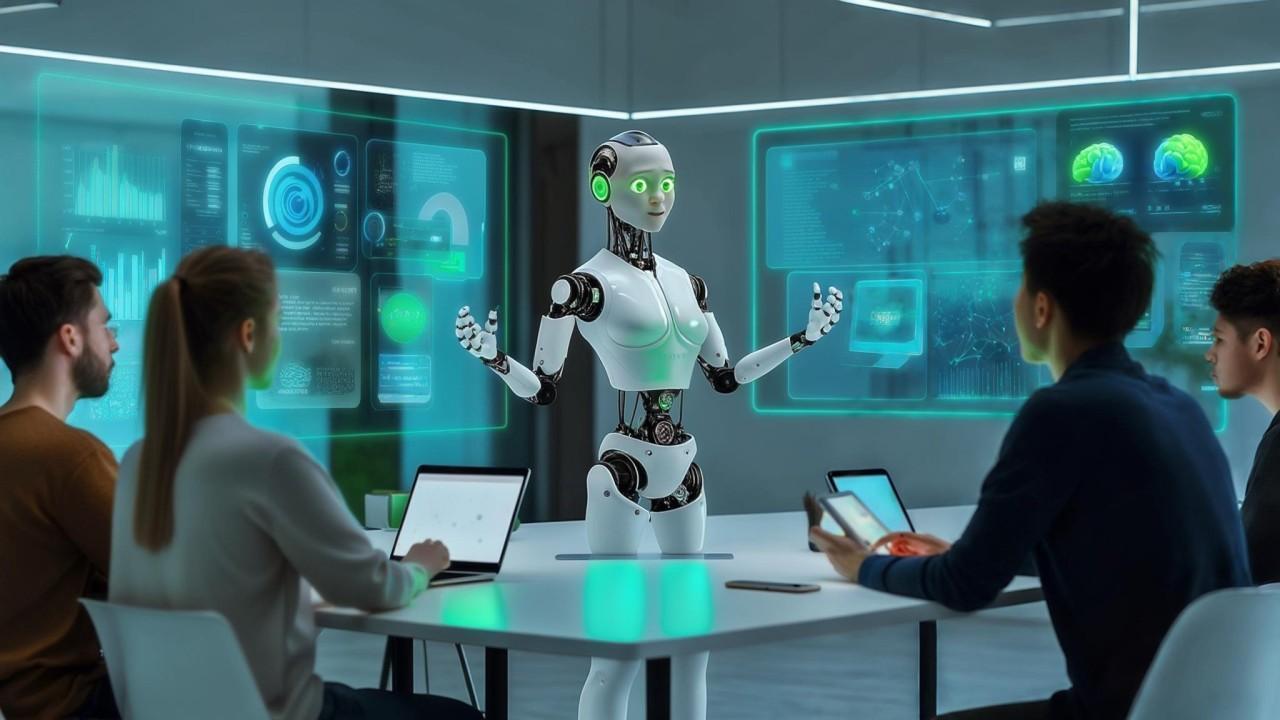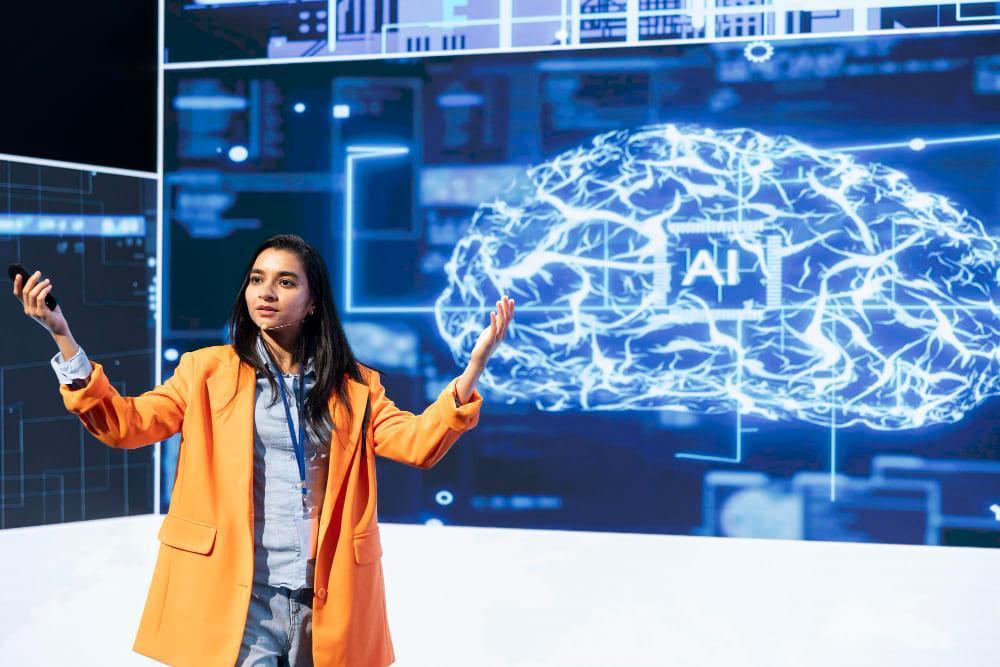AI in Education: Shaping Tomorrow's Learning Landscape
- Home
- AI in Education: Shaping Tomorrow's Learning Landscape

AI in Education: Shaping Tomorrow's Learning Landscape
- Vanessa Richards
Traditional educational models often struggle to keep pace with the rapidly evolving demands of the modern world. Classrooms frequently operate on a one-size-fits-all principle, where curriculum delivery is standardized, and student engagement can vary dramatically. This approach, while foundational, often fails to cater to diverse learning styles, paces, and individual aptitudes, leading to disengagement and underperformance for many. The rigid structure limits personalized growth and genuine intellectual curiosity.
A significant challenge in current educational systems is the inherent difficulty in providing truly personalized learning experiences for every student. Educators, burdened by large class sizes and extensive administrative tasks, find it nearly impossible to tailor lessons, assignments, and feedback to individual needs. This lack of customization means that gifted students may not be sufficiently challenged, while those who struggle might not receive the targeted support they desperately require to succeed.
Current assessment methods, predominantly relying on standardized tests and fixed assignments, often provide a narrow view of a student's true understanding and potential. These evaluations can be high-stakes, causing undue stress, and may not accurately reflect critical thinking, creativity, or practical application of knowledge. The focus on rote memorization over deeper comprehension is a persistent issue, hindering the development of essential 21st-century skills crucial for future success in a dynamic global economy.
Teachers globally face immense pressure, juggling curriculum delivery, student support, administrative duties, and professional development. This overwhelming workload can lead to burnout and limits their capacity to innovate or provide extensive individualized attention. Furthermore, many educational institutions, particularly in underserved areas, grapple with resource limitations, including access to up-to-date materials, specialized tools, and ongoing professional training for staff, creating significant disparities.
The world is changing at an unprecedented rate, and educational systems must prepare students for jobs and challenges that don't even exist yet. The skills needed are shifting from mere information recall to critical thinking, problem-solving, adaptability, and digital literacy. Without innovative approaches, education risks becoming obsolete, failing to equip the next generation with the competencies necessary to thrive in a dynamic global landscape. This gap highlights an urgent need for transformation.
Understanding the Core Issues
- Outdated Pedagogical Models: Many educational frameworks are rooted in industrial-era principles, prioritizing uniformity over individuality. This resistance to change stifles innovation and limits the adoption of more dynamic, student-centric approaches.
- Resource Constraints: Schools often lack sufficient funding for advanced technologies, specialized training for educators, and smaller class sizes, directly impacting the quality and personalization of instruction across the board.
- Technological Integration Gaps: Despite the availability of technology, effective integration into daily learning is often inconsistent due to lack of teacher training, infrastructure, or a clear strategic vision for its application.
Transformative Solutions with AI
1. Personalized Learning Pathways with AI Tutors
AI can revolutionize learning by creating highly individualized educational paths. Imagine a system that assesses a student's strengths, weaknesses, and preferred learning style, then dynamically adjusts content, pace, and difficulty. AI-powered tutors can provide immediate, targeted feedback, answer questions 24/7, and even identify areas where a student might be struggling before they become significant issues. This ensures every learner receives the precise support they need to excel. 
This approach moves beyond static textbooks, offering interactive simulations, adaptive quizzes, and engaging multimedia content tailored to each student. For instance, Utrixaaso's solutions could analyze performance data to recommend supplementary materials or alternative explanations, transforming a passive learning experience into an active, responsive journey. It empowers students to take ownership of their education, fostering deeper comprehension and sustained engagement.
2. Enhanced Educator Support and Administrative Automation
AI isn't about replacing teachers; it's about empowering them. By automating routine administrative tasks such as grading objective assignments, managing schedules, and tracking student progress, AI frees up valuable time for educators. This allows them to focus more on mentorship, creative lesson planning, and providing high-impact, individualized attention where it matters most – fostering critical thinking and socio-emotional development.
Furthermore, AI tools can provide teachers with powerful analytics on student performance and engagement, offering insights that were previously unattainable. This data-driven approach enables educators to identify trends, pinpoint common misconceptions, and adapt their teaching strategies proactively. Utrixaaso believes in leveraging AI to augment human capabilities, ensuring teachers can dedicate their expertise to truly transformative educational moments.
3. Intelligent Content Curation and Development
The sheer volume of information available today can be overwhelming. AI can act as a powerful curator, sifting through vast databases to identify and present the most relevant, up-to-date, and engaging educational content. This includes creating dynamic textbooks, interactive modules, and virtual reality experiences that bring abstract concepts to life, making learning more immersive and accessible across various subjects.
AI can also assist in the rapid development of new educational materials, adapting existing content for different age groups or learning objectives. For example, it could generate practice problems, summarize complex texts, or even translate materials, broadening access to quality education globally. This capability ensures that learning resources remain fresh, pertinent, and responsive to emerging knowledge and skills requirements. Utrixaaso is committed to pioneering these advancements.
Potential Challenges and Mitigation
- Ethical Concerns and Data Privacy: The collection of student data raises significant privacy and ethical questions. Recommendation: Implement robust data encryption, anonymization protocols, and transparent usage policies, ensuring compliance with global regulations and building trust.
- Digital Divide Exacerbation: Unequal access to technology and internet connectivity could widen the gap between well-resourced and underserved communities. Recommendation: Develop affordable, accessible solutions and advocate for universal digital infrastructure and equitable distribution of resources.
- Over-reliance and Skill Atrophy: Excessive dependence on AI tools might hinder the development of fundamental human skills like critical thinking, problem-solving, and independent research. Recommendation: Design AI integration to complement, not replace, core human cognitive processes, emphasizing balanced use and skill development.
 Utrixaaso
Utrixaaso
Comments 4